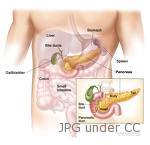Pancreatic Cancer facts
Pancreatic cancer is another deadly form of cancer which results in the growth of malignant cells in and around the pancreatic glands i.e. the pancreas. This is indeed a deadly condition because the numbers of patients who survive this disease are very few. This disease mostly occurs in males however there have been cases where the female lives have been affected with this condition. The causes, the symptoms, diagnosis and the treatment procedures involved in this disease are given clearly in this article.
Pancreatic cancer causes
:
The major cause of this cancer is the age of the individual. This disease is more prolific with the older generation particularly the people who are over sixty years. Another important cause of a pancreatic cancer is being male. Yes, males who are over sixty are prone to this disease. However, the exact reason for this cause could not be established.
As we all know, smoking contribute to the cause of any form of cancer and this disease is not an exception. Smoking increases the risk of this cancer (However the onset of lung cancer is much more seen in the case of smoking). The consumption of alcohol enhances the chances of pancreatic cancer. Obesity and diabetes mellitus contributes to the cause as well. Another major cause for this disease is the consumption of fat rich meats over a long period of time which invariably affects the pancreas. Hereditary reason and modifications in the genome can cause pancreatic cancer as well.
Symptoms
The symptoms of this disease is not as pronounced or does not show any drastic signs that could confirm the presence of this condition. And it is for this reason that this disease is called as the “silent killer” because the patient is invariably unaware that he/she is suffering from this disease. However certain mild symptoms that can lead to the diagnosis are listed below.
Frequent pain in the abdominal region along with the loss of appetite is the distinguishing symptom of this disease. However this alone will not confirm the presence of a pancreatic cancer. Added symptoms like jaundice, depression and vein related problems involving blood clots could confirm the presence of this disease.
Diagnosis
As said earlier, symptoms alone will not suffice the confirmation of this disease and hence diagnostic tools are necessary in the case of this disease. The tests include the CT scan, liver function tests, endoscopic ultrasound tests etc. The Computed Tomography (CT) scan is the most effective method of determining pancreatic cancer. The result of the scan is used to analyze the presence of microRNAs which are specific for this type of cancer.
Treatment
There are many methods to cure pancreatic cancer and the most popular method is the surgery where the affected part is removed so as to avoid further metastasis i.e. spread of the malignant cells to other parts of the body. The removal of the affected region is complex because it involves separating of the pancreatic head and bypassing it with the jejunum. Another method is the distal pancreatectomy.
Radiation therapy is also followed in the case where the condition is on a less severe case. Chemotherapy is the best solution for all those with problems in undergoing surgical treatments. However this method does not ensure a longer survival of the affected patient. Some of the popular drugs used to cure or prevent the further increase of pancreatic cancer are Gemcitabine, Oxaliplatin and Fluorouracil.
This form of cancer can ensure only a maximum survival period of five to six years and not more than that. So, it would be very good on the part of every individual to prevent the onset of this disease with proper health care, diet and hygiene.

